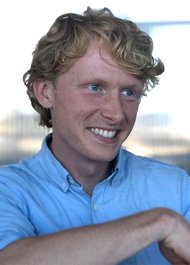Models and Mechanisms of Turn-Taking in Human & Non-Human Animals
IMC Tuesday Seminar: Talk by Christopher Cox, Dept of Linguistics, Cognitive Science & Semiotics and IMC, Aarhus University, and Dept of Language & Linguistic Science, University of York
Info about event
Time
Location
Jens Chr. Skous Vej 4, 8000 Aarhus C, building 1483, room 312 and online (https://aarhusuniversity.zoom.us/my/imcevent)

Abstract
What can we learn about human language from communicative exchanges in bush crickets and whales? Communicative sound exchanges play a crucial role in the lives of many biological organisms and take a mind-blowing variety of forms - bush crickets communicate with mates over short distances by producing sound pulses during the closing stage of their wing cycle, and elephants produce low-frequency vocalisations at such high amplitudes that they vibrate through the surface of the ground to be detected by other elephants up to 10 kilometres away. No matter the form, all of these types of exchanges need to take timing into account. Interacting animals have to account for when the others are communicating, in some cases to avoid overlap (e.g., cetacean and avian species) and in other cases to produce synchronous vocalisations (e.g., anuran and katydid species).
In human communicative exchanges, timing is also key. A lot of research tries to disentangle how we learn to speak effortlessly to each other, shift rapidly between being talker and listener, and display a surprisingly low number of overlaps. In this talk, I will first systematically review the studies on how the ability to take turns develops in young human infants and identify crucial issues in the current way of investigating this capability. To provide alternative perspectives, I will then systematically review how turn-taking has been investigated and mathematically modeled in non-human animals - where researchers cannot rely as strongly on personal intuitions as to how turn-taking takes place. Finally, I will present a first exploratory analysis of child-caregiver turn-taking dynamics using models inspired by the non-human animal literature.
About the speaker
Christopher Cox
PhD student
Department of Linguistics, Cognitive Science & Semiotics and Interacting Minds Centre, Aarhus University
Department of Language & Linguistic Science, University of York
